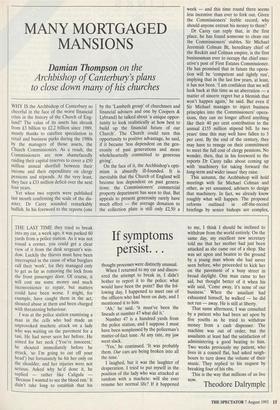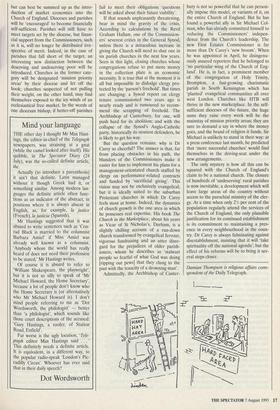MANY MORTGAGED MANSIONS
Damian Thompson on the Archbishop of Canterbury's plans to close down many of his churches
WHY IS the Archbishop of Canterbury so cheerful in the face of the worst financial crisis in the history of the Church of Eng- land? The value of its assets has shrunk from £3 billion to £2.2 billion since 1989, mostly thanks to carefree speculation in retail and business parks during the 1980s by the managers of those assets, the Church Commissioners. As a result, the Commissioners are now shamefacedly raiding their capital reserves to cover a £50 million annual shortfall between their income and their expenditure on clergy pensions and stipends. At the very least, they face a £33 million deficit over the next four years.
Yet when two reports were published last month confirming the scale of the dis- aster, Dr Carey sounded remarkably bullish. In his foreword to the reports (one by the 'Lambeth group' of churchmen and financial advisers and one by Coopers & Lybrand) he talked about 'a unique oppor- tunity to look realistically at how best to build up the financial future of our Church'. The Church could turn this opportunity to positive advantage, he said, if it became 'less dependent on the gen- erosity of past generations and more wholeheartedly committed to generous giving'.
On the face of it, the Archbishop's opti- mism is absurdly ill-founded. It is inevitable that the Church of England will become less dependent on past genera- tions: the Commissioners' commercial property department has seen to that. But appeals to present generosity rarely have much effect — the average donation to the collection plate is still only £2.50 a week — and this time round there seems less incentive than ever to fork out. Given the Commissioners' feeble record, why should anyone entrust his money to them?
Dr Carey can reply that, in the first place, he has found someone to clean out the Commissioners' stables. Sir Michael Jeremiah Colman Bt, hereditary chief of the Reckitt and Colman empire, is the first businessman ever to occupy the chief exec- utive's post of First Estates Commissioner. He has promised that in future the opera- tion will be 'competent and tightly run', implying that in the last few years, at least, it has not been. 'I am confident that we will look back at this time as an aberration — a matter of sincere regret but a blemish that won't happen again,' he said. But even if Sir Michael manages to inject business principles into the Commissioners' opera- tions, they can no longer afford anything like their 40 per cent contribution to the annual £155 million stipend bill. In two years' time this may well have fallen to 5 per cent. By the end of the century, they may have to renege on their commitment to meet the full cost of clergy pensions. No wonder, then, that in his foreword to the reports Dr Carey talks about coming up with 'machinery for taking forward the long-term and wider issues' they raise.
This autumn, the Archbishop will hold meetings with Sir Michael Colman and other, as yet unnamed, advisers to design that machinery. In fact, we already know roughly what will happen. The proposed reforms outlined in off-the-record briefings by senior bishops are complex but can best be summed up as the intro- duction of market economics into the Church of England. Dioceses and parishes will be 'encouraged' to become financially self-sufficient. Parishes will still have to meet targets set by the diocese, but finan- cial support from the Commissioners, such as it is, will no longer be distributed irre- spective of merit. Indeed, in the case of parishes that fall short of the target, an interesting new distinction between the deserving and undeserving poor will be introduced. Churches in the former cate- gory will be designated 'mission priority areas' by their diocese and let off the hook; churches suspected of not pulling their weight, on the other hand, may find themselves exposed to the icy winds of an ecclesiastical free market. In the words of one diocesan bishop, if better-off parishes fail to meet their obligations 'questions will be asked about their future viability'.
If that sounds unpleasantly threatening, bear in mind the gravity of the crisis. According to calculations by the Revd Graham Hallam, one of the Commission- ers' severest critics in the General Synod, unless there is a miraculous increase in giving the Church will need to shut one in six parish churches in the next few years. Seen in this light, closing churches whose congregations refuse to put more money in the collection plate is an economic necessity. It is true that at the moment it is all but impossible to dislodge clergy pro- tected by the 'parson's freehold'. But times are changing: a Synod report on clergy tenure commissioned two years ago is nearly ready and is rumoured to recom- mend the scrapping of freehold. The Archbishop of Canterbury, for one, will push hard for its abolition; and with the collapse of the Synod's Anglo-Catholic party, historically its stoutest defenders, he is likely to get his way.
But the question remains: why is Dr Carey so cheerful? The answer is that, far from placing obstacles in his path, the blunders of the Commissioners make it easier for him to implement his plans for a management-orientated church staffed by clergy on performance-related contracts and funded by 'sacrificial giving'. This vision may not be exclusively evangelical, but it is ideally suited to the suburban Protestant churches in which Dr Carey feels most at home. Indeed, the dynamics of church growth is the one area in which he possesses real expertise. His book The Church in the Marketplace, about his years as Vicar of St Nicholas's, Durham, is a slightly chilling account of a run-down church transformed by evangelical fervour, vigorous fundraising and an utter disre- gard for the prejudices of older parish- ioners, whom he describes as 'stalwart people so fearful of what God was doing [ripping out pews] that they clung to the past with the tenacity of a drowning man'. Admittedly, the Archbishop of Canter- bury is not so powerful that he can person- ally impose this model, or variants of it, on the entire Church of England. But he has found a powerful ally in Sir Michael Col- man, who has already committed himself to reducing the Commissioners' indepen- dence from the Church's leadership. The new First Estates Commissioner is far more than Dr Carey's 'new broom'. When he was appointed in April, he disingenu- ously assured reporters that he belonged to `no particular wing of the Church of Eng- land'. He is, in fact, a prominent member of the congregation of Holy Trinity, Brompton, a fast-growing charismatic parish in South Kensington which has `planted' evangelical communities all over west London. Churches like HTB will thrive in the new marketplace. In the self- sufficient dioceses of the future, the huge sums they raise every week will be the mainstay of mission priority areas; they are sure to demand a say in where the money goes, and the brand of religion it funds. Sir Michael is unlikely to stand in their way: at a press conference last month, he predicted that 'more successful churches' would find themselves in the driving-seat under the new arrangements.
The only mystery is how all this can be squared with the Church of England's claim to be a national church. The closure of hundreds of 'undeserving' rural parishes is now inevitable, a development which will leave large areas of the country without access to the parochial ministry of the cler- gy. At a time when only 2Y2 per cent of the population regularly attend the services of the Church of England, the only plausible justification for its continued establishment is its commitment to maintaining a pres- ence in every neighbourhood in the coun- try. Dr Carey is always fulminating against disestablishment, insisting that it will 'take spirituality off the national agenda'; but the effect of his reforms will be to bring it sev- eral steps closer.
Damian Thompson is religious affairs corre- spondent of the Daily Telegraph.



















































 Previous page
Previous page